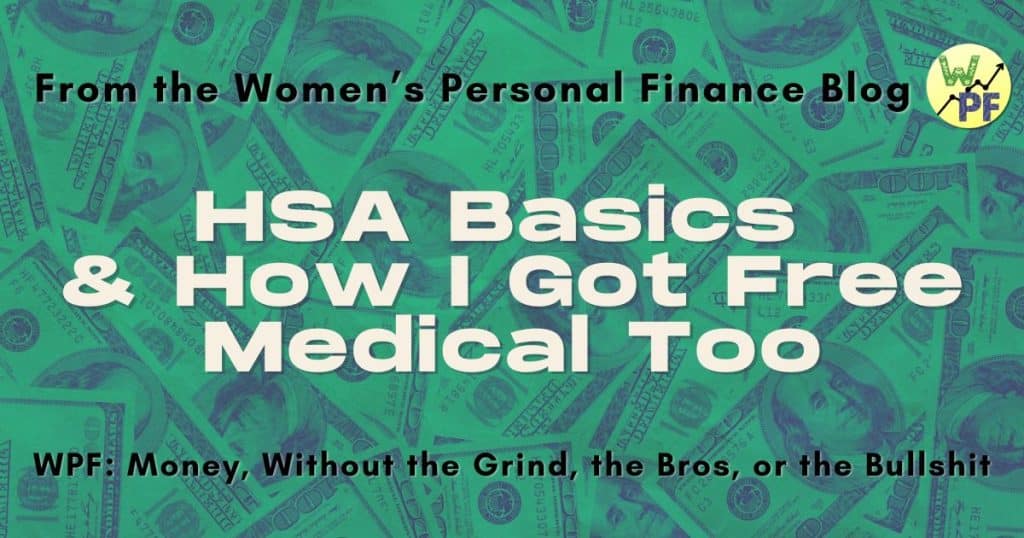This post may contain affiliate links and WPF may earn money or products from companies mentioned. Our guest post plugin stopped working! Please note that the authors listed may not be accurate here :( More info
You probably aren’t thinking about HSA accounts right now, and are more concerned with the rising cost of healthcare. But keep reading, because while it doesn’t make things better, you might be able to optimize this shitty situation.
According the the Bureau of Labor and Statistics, 50% of workers had access to a high deductible health plan (and with that, likely an HSA or health savings account) in 2024. In 2015 only 38% had access to a HDHP!
We’d need an economist to speak on if this is actually a good thing in terms of overall trends (my gut feeling is that generally speaking, it’s nefarious, not due to some mass awakening and optimization of personal financial acumen and tools).
While I don’t know what the stats were back in 2018 when I originally wrote this article for my old blog, That Frugal Pharmacist, I think it’s an important topic to revisit as we near the end of 2025.
Please note, this old article is presented without edits (other than changing how I “get” to how I “GOT” free healthcare for the title section, plus some added commentary before we dive in.
We’ve been talking a lot about legal ways to shield your paycheck from the current regime. And while you most commonly hear us talk about upping your 401k contributions, the triple tax-advantaged HSA isn’t getting enough airplay.
You all have had legitimate concerns about shoveling more money into a 401k (assuming there’s any leftover to do so) when there are honest discussions to be had about whether we’ll even have access to that money by the time we all hit retirement or if the whole system will have fallen apart. I share those reservations, and I’d like to present the HSA as an alternative that gives you options to access your money sooner, in certain cases.
As with all things, a diversified approach never hurts. At the time of this intro/update (late 2025), my HSA account has $99,514 in it, most of which is investment growth. By the time you read this, there’s a good chance it will have hit 6 figures. I also have spreadsheets going back quite a few years documenting my out-of-pocket medical spending, so I can reimburse myself out of my HSA if I ever need to, before I tap something like a retirement fund and incur penalties.
But most importantly, I think given the skyrocketing cost of health insurance, which is predicted to rise significantly for almost everyone moving into 2026, many more people will be considering picking the highest deductible plan offered and doing their best to save some money on their premiums. We have yet to see how bad this is all going to be, as many people are still getting their plan selection information for 2026, and we have no idea if the ACA subsidies will be reissued with our ongoing government shutdown hanging in part on this factor.
So while some may be considering HDHPs due to unwanted external pressures, I don’t necessarily think it’s a bad choice, especially if you can be strategic about it. Personally, I have only ever purchased for “catastrophic” coverage myself until I had an ACA subsidy plan to shop for. Then, I was incentivized to pick another type of plan.
While “free medical” or covered premiums may not be something you can effectively engineer, and you may not even get an employer match, I urge you to read on and get a better understanding of this little-discussed financial tool and how to potentially make the most out of a shitty situation.
TLDR: If it makes sense for your budget, consider enrolling in a HDHP plan and saving the difference between premiums and your deductible in your HSA or up to the maximum annual HSA contribution.
Make sure you run some numbers using examples like this:
Example: Monthly premium is $400 for HDHP vs. $750 for the mid-range plan. HDHP deductible if $4,000 — save the $350 difference monthly in your HSA and net yourself $4,200 in savings that’s yours forever/until you need it (the individual maximum HSA contribution in 2026 in $4,400 and $8,750 for a family). If you get sick, you’ve already got your deductible amount saved. If you don’t get sick, you didn’t waste money on a plan you didn’t use. Maximum out of pocket spending (MOOP) for an individual, *in-network, for 2026 is $10,600. While not insignificant, you’re nearly 40% of the way to your MOOP already.
And now- back to our 2018 deep dive!
Table of Contents
What is an HSA? Just what it says it is, a “Health Savings Account.”
Many employees are eligible for either an HSA or a FSA (flexible spending account) as a money savings mechanism for health purchases when they are purchasing insurance.
HSA vs. FSA accounts
The most common confusion I seem to run into when mentioning my HSA account, even at my doctor or dentist’s office is: it is not the same thing as a flexible spending account (FSA).
I can see why people would be confused. At first glance, they are very similar. In both you put away money pre-tax, decreasing taxes on your take home pay. You use the money from both to pay for eligible purchases such as copays and office visit costs and prescriptions. In both, an employer may contribute in addition to what the employee adds.
But that’s pretty much where the similarities end. And here is the biggest, most important difference:
In an HSA you, the employee, owns all your money. In an FSA, the employer owns any funds you don’t use at the end of the year.
This sounds CRAZY! Because I have rarely used my insurance for more than a few doctor visits, I have not been willing to put myself in a situation where I leave money on the table at the end of the year. I have never opted to use an FSA when I had an HSA as another option (or at any other time, I’ve never used an FSA).
There are some other caveats of course. And anyone who has both presented to them as an option should carefully read your plan literature in deciding which is for you. In an FSA you have access to all of the money from the beginning of the plan year. In an HSA, you only have access to what you have saved so far (and any employer match if you have it).
Some other differences include you can contribute significantly more to an HSA than an FSA. Additionally, to take part in an HSA you must be participating in a high-deductible insurance plan (aka HDHP). For 2018, that means you must be have a minimum annual deductible of $1350 for an individual or $2700 for a family.
Another important difference is, as long as you meet the above deductible qualifications, you can sign up for an HSA plan on your own, through many banking/investment organizations. You do not necessarily have to go through an employer. With an FSA, because the employer technically “owns” the funds, you can only use it if you sign up through your employer.
It’s like a 401k, for your health
I already mentioned that your HSA contributions are pre-tax and reduce your taxable income. An HSA also grows tax free as long as you continue to use it for approved health related expenses. Once you hit 65, you can use the money for anything, as if it had been a traditional IRA (here’s some good info on how your HSA fees change after 65). Use it early, and you’ll be hit with tax penalties.
At a pretty healthy maximum contribution rate of $3450 for individuals and $6900 for families for 2018, if you can max this account out, that is some serious savings you are putting away for future health spending. I have been maxing out my HSA for 4 years. Even after paying for a baby labor and delivery and some major surgery for my husband (on top of dental visits, eyeglasses, etc) I have over $25,000 in my HSA accounts.
You won’t believe this!
Like a 401k, many employers also offer some form of match. My employer offers both a partial match to a certain dollar value AND they offer bonus HSA contributions for meeting health targets (such as BMI or not being a smoker).
“The ultimate HSA hack”
Between my company HSA match and my family meeting health screening targets: my premiums for both medical and dental are effectively FREE!
Seriously! Check the math if your employer offers any incentives. I consider my employer match money “free money” since it goes in to an account I own. This means they’re also paying the insurance premiums for my family.
So who is an HSA good for?
As a family who doesn’t spend a lot on medical expenses, this is a great option for us. Why would I want to pay more in monthly premiums for insurance that I wouldn’t even use?
I wish I had the napkins I did all my calculations on, but my logic came to something like this (and I checked this for two different jobs with HSA accounts):
Dollar for dollar, if you looked at the cost (my options) for a traditional plan with “high” premiums with no HSA versus a high-deductible plan + my monthly HSA contribution, I was paying close to the same amount per month for either plan.
Lemme break it down:
I tried to explain it like car insurance to another employee. Because I know that I can afford to meet my deductible of $3000 before insurance kicks in, I get to pay a much lower premium throughout the year (this logic applies whether or not you decide to open up an HSA account). But because I am tax incentivized to open the HSA account, I feel doubly confident that I will be able to pay my deductible if I have to, and I grow my money tax free!
Seems like a no brainer to me! Especially with the maximum out of pocket spending on high deductible plans defined by the IRS as $6650 for an individual and $13300 for a family for 2018 (meaning the most you can be charged in a plan year for your medical care before insurance picks up all the rest). If you keep contributing to the health savings account over the years you should have a safe amount to cover any catastrophes, childbirth, etc.
Factor in any company match if you get it. You might be throwing money in the trash not taking advantage of your HSA plan.
And when you really start accumulating you can invest those funds…
USUALLY. There may be some plans where this doesn’t work, so make sure you to read your plan paperwork. I would think you could roll it over to somewhere where you can invest also. I’m not going to get into this here, but, it’s an important part of your account. When you’ve reached certain balance minimums, you can begin investing. This is when the HSA becomes a really powerful tool for your retirement planning. Once you hit 65 you can generally pay for your medicare or private health insurance premiums with your HSA with no penalty OR taxes on top of regular health spending.

